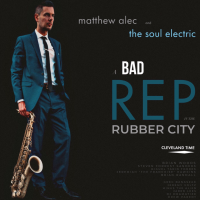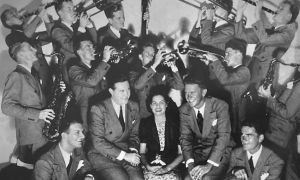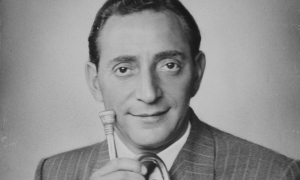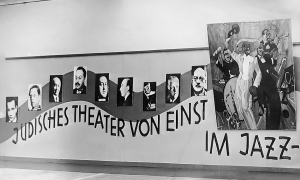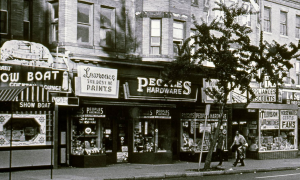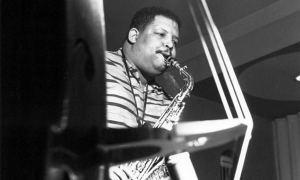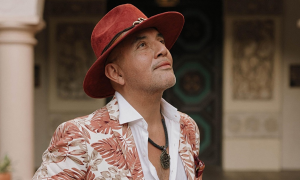Home » Jazz Articles » History of Jazz » Bird's Trumpets
Bird's Trumpets
Rolf Ericson
Rolf Ericson (1922-1997) is one of the most interesting of Bird's trumpets. In November 1950 Billy Shaw set up a tour of Sweden as a single. 28-year-old Rolf Ericson became Bird's trumpeter. It is believed that Parker was off heroin but drinking heavily at the time. Ericson had already been stateside with Charlie Barnet and Woody Herman. He started playing after hearing Louis Armstrong in person. He was a true original with his own distinct puckish sound and had the chops and ideas to go with it. While he clearly listened to Bird's previous trumpets, he has an altogether different approach playing his own style that really wasn't bop or swing. Parker clearly enjoyed the exchange on four recorded tunes. All the tempos were slower and more relaxed as perhaps Parker sought an easier accessed common ground with the Swedish musicians. On "Cool Blues," Ericson responded to Parker's phrases just like someone who understood he said, and then added his own response back to him. They just got each other and were clearly having fun understanding each other. On "Anthropology," Parker sounds inspired. The challenge was to respond with ideas, and Ericson only tapped out once with a display of upper register range. At times they achieved a similar linear connection. Parker sometimes even responded to Ericson instead of always "speaking first." On "Scrapple From The Apple," Ericson snuck in some "Ornithology." During "Fine And Dandy," Ericson fully reached the status of a collaborator with Parker, despite his limited experience. Back in the United States, he recorded three times with Charles Mingus, and he was with Duke Ellington from 1963-1971, the ultimate stamp of jazz authenticity. Parker and Ericson's exchange speaks volumes to a shared humanity and is a luminescent moment in Bird's Trumpets.Joe Gordon and Herb Pomeroy
The final two trumpeters to cross paths with Bird on a significant level were both hired when he went to play in Boston. Twenty-four-year-old Joe Gordon (1928-1963) played with Parker in 1952 at the Hi-Hat. Though on YouTube Herbie Williams is listed on trumpet, Lawrence Koch has identified Gordon, as well as Charles Mingus on bass, Roy Haynes on drums, and Dick Twardzik on piano. Symphony Sid announced this line-up after they played "Groovin' High." Gordon was a professional and possessed a super clean technique, almost too clean, void of tension. He didn't have his own sound yet and sounds like he was listening to Davis and Gillespie. There's no wrinkle or surprise, but more like a blueprint when he played solos. He worked for Parker, but Parker's impact on him and their playing relationship was difficult to determine, though Bird did enjoy his work. Gordon was prolific, playing with Dexter Gordon, Thelonious Monk, and Gillespie's big band before he died in a fire in 1963.Herb Pomeroy (1930-2007) was also hired by Parker and was captured again at the High-Hat in 1953. 23-year-old Pomeroy does the job as a sideman. He sounds slightly hyper and less assured than Gordon. Pomeroy sounds like Miles Davis with a cup mute on "Laura." On "Cool Blues," the Davis influence comes through again. Pomeroy joined the Berklee College of Music faculty in 1955 and was still there in 1991 when I attended my one semester there. Pomeroy made fun of my composition on a blues to his composition class because I used a flat five in every bar. I was 21, two years younger than he was when he played with Parker. Pomeroy reached the status of an effective sideman.
These days the general public still focuses on Parker's addiction more than his music. I've always believed in the approach Gary Giddins took, that Parker was a genius who was one of the greatest musicians in jazz despite that adversity. The more human side of his story is often lost. The tradition of mentorship was very much in effect in the bebop years, and Parker participated in his own way. As difficult as the trumpet is, playing bebop with Parker at his preferred tempos is one of the greatest technical challenges that trumpet players have faced throughout jazz history. Dizzy Gillespie remains unique as being able to enter Parker's personal space on a technical level. Miles Davis, Kenny Dorham, and Red Rodney essentially all took the Charlie Parker course on the ultimate level and graduated. Fats Navarro and Rolf Ericson where strong individuals in their own right. Parker's use of trumpet players as his front line cemented the saxophone/trumpet format that became so prevalent in jazz and remains so. The format continued into free jazz during Ornette Coleman's early recordings with Don Cherry.
I hope this study sheds light on the human aspects of Charlie Parker's music and relationship to the trumpet. Following Monk's Trumpets, I plan to finish this 3-part series with a study titled Miles Tenors, placing Miles Davis in the role of a teacher following his role as student with Parker.
Special thanks to Dr. Henry Martin, Carl Woideck, Lawrence Koch, and Chuck Haddix. Their work on Parker was essential to the research for Bird's Trumpets. The piece is dedicated to Phil Schaap.
Photo credit: "Charlie Parker and Red Rodney watching Dizzy Gillespie, New York City, 1947" by William Gottlieb
Tags
History of Jazz
Charlie Parker
Matt Lavelle
United States
New York
New York City
Herb Pomeroy
Joe Gordon
Chet Baker
Rolf Ericson
Fats Navarro
Red Rodney
Kenny Dorham
Miles Davis
Howard McGhee
Dizzy Gillespie
Benny Harris
"Step-Buddy" Anderson
Comments
PREVIOUS / NEXT
Support All About Jazz
 All About Jazz has been a pillar of jazz since 1995, championing it as an art form and, more importantly, supporting the musicians who make it. Our enduring commitment has made "AAJ" one of the most culturally important websites of its kind, read by hundreds of thousands of fans, musicians and industry figures every month.
All About Jazz has been a pillar of jazz since 1995, championing it as an art form and, more importantly, supporting the musicians who make it. Our enduring commitment has made "AAJ" one of the most culturally important websites of its kind, read by hundreds of thousands of fans, musicians and industry figures every month.












